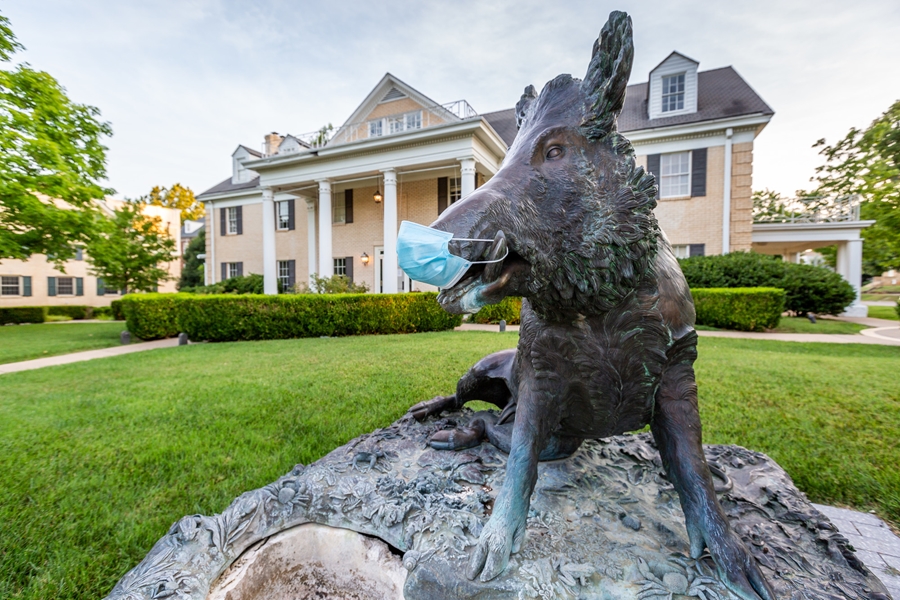
FAYETTEVILLE, Ark. – Quarantine and isolation procedures continue to be a necessary step in mitigating the spread of COVID-19, especially within our campus community.
As the spring semester nears, students, faculty and staff should be aware that the university’s quarantine and isolation guidance has been adjusted to align with guidance for the general public from the CDC (Centers for Disease Control and Prevention) including at least five days at home for those with positive COVID-19 tests or those who have been exposed or identified as a close contact.
WHEN TO STAY HOME
Whether you are fully vaccinated, partially vaccinated or not vaccinated, there are a few things to remember if you test positive for COVID-19, have symptoms or come in close contact (within 6 feet for 15 or more cumulative minutes over a 24-hour period) with someone who has tested positive for COVID-19.
If You Test Positive For COVID-19 OR Have Symptoms (Regardless of Vaccination Status):
-
Stay home for 5 days (after test results or first symptoms) and isolate from others.
-
If you had symptoms, you can end isolation after 5 days, IF you are fever-free for 24 hours (without medicine) and symptoms are improving.
-
If you do not develop symptoms, you can end isolation after 5 days.
-
Continue to take precautions (wear a mask, avoid travel, avoid those at high risk) for 10 days (after test results or first symptoms).
If you are severely ill with COVID-19, you should isolate for at least 10 days and consult your doctor before ending isolation.
If You Were Exposed To COVID-19 and Are NOT Up-To-Date On Vaccinations (Includes Unvaccinated, Partially Vaccinated, Vaccinated Without Booster):
-
Stay at home (quarantine) for at least 5 days and wear a mask around others at home.
-
Get tested 3-5 days after your close contact. If you test positive, remain at home and begin isolation process outlined above.
-
Watch for symptoms until 10 days after close contact even if your test result is negative.
-
If you develop symptoms, isolate immediately.
-
Continue to take precautions (wear a mask, avoid travel, avoid those at high risk) until 10 days (after close contact).
If You Were Exposed to COVID-19 and are Up-To-Date on Vaccinations OR Have Been Infected Within the Last 90 Days (Includes Fully Vaccinated with a Booster):
-
You do not need to stay home unless you have symptoms.
-
Even if you don’t have symptoms, get tested 3-5 days following close contact with someone with COVID-19.
-
Watch for symptoms until 10 days after close contact even if your test result is negative.
-
If you develop symptoms, isolate immediately, wear a mask and set an appointment to be tested.
-
Continue to take precautions (wear a mask, avoid travel, avoid those at high risk) until 10 days (after close contact).
WHERE TO GET TESTED
Testing is available in the area and by appointment at Pat Walker Health Center for all university students and employees.
To schedule COVID-19 testing on campus, contact Pat Walker Health Center at 479-575-4451, option 1, or schedule an appointment online at myhealth.uark.edu.
SELF-REPORTING A POSITIVE COVID-19 CASE
If you were tested off-campus or used a self-test at home and received a positive test for COVID-19, you must self-report your case to U of A Emergency Management using the online self-reporting form.
If you were tested on-campus, you do not need to self-report as your case information is provided directly to Emergency Management by the university.
NOTIFYING OTHERS OF POSITIVE COVID-19 CASES
If you have tested positive — or been identified as a close contact — we encourage you to reach out to those you have recently been in close contact with to inform them of your status. This is key to helping keep our campus community safe.
The university's COVID-19 Response site continues to be updated during the pandemic with the latest news and information for the campus community.
About the University of Arkansas: As Arkansas' flagship institution, the U of A provides an internationally competitive education in more than 200 academic programs. Founded in 1871, the U of A contributes more than $2.2 billion to Arkansas’ economy through the teaching of new knowledge and skills, entrepreneurship and job development, discovery through research and creative activity while also providing training for professional disciplines. The Carnegie Foundation classifies the U of A among the top 3% of U.S. colleges and universities with the highest level of research activity. U.S. News & World Report ranks the U of A among the top public universities in the nation. See how the U of A works to build a better world at Arkansas Research News.
Topics
Contacts
John Thomas, director of media relations
University Relations
479-575-7430,
jfthomas@uark.edu